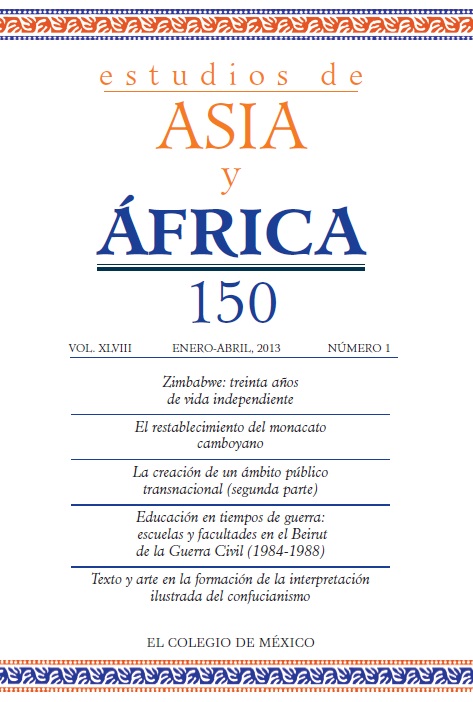Abstract
The aim of this paper is to provide elements in order to explain the economic and political developments —without being exhaustive— which have taken place in Zimbabwe’s first thirty years of independence (1980-2010), with the purpose of contributing to the understanding of both the crisis which has unfolded and the complexity which has been exposed in the search for solutions.
As a starting point, we are faced with the fact that often Zimbabwe’s history is not well known, which makes it difficult to understand the current crisis. The paper begins with an introduction that briefly presents the main features of the colonial period. The analysis of the years between 1980 and 2010 is divided in three periods and, with explanatory purposes, the economic and political developments in each of these periods are treated separately. The paper concludes with a general overview of the political arena between April 2010 and July 2012.
References
Africa Research Bulletin. Political, Social and Cultural Series, Blackwell Publishing Ltd., del vol. 38, núm. 1, 2001, al vol. 49, núm. 3, 2012. [http://wileyonlinelibrary.com/journal/arbp.]
Agreement between the Zimbabwe African National Union-Patriotic Front (ZANU-PF) and the two Movements for Democratic Change (MDC) formations, on resolving the challenges facing Zimbabwe, 2008. [www.kubatana.net.]
Alexander, Peter, “Zimbabwean Workers, the MDC & the 2000 Election”, Review of African Political Economy, vol. 27, núm. 85,2000, pp. 385-406.
Alexander, Jocelyn, JoAnn McGregor y Terence Ranger, “Civilian Perspectives on the 1980s Conflict”, en Alexander, McGregor y Ranger, Violence and Memory. One Hundred Years in the “Dark Forests” of Matabeleland, Oxford-Portsmouth-Harare, James Currey-Heinemann-Weaver Press, 2000.
Animashaum, Modeed Adekunle, “State Failure, Crisis of Governance and Disengagement from the State in Africa”, Africa Development, vol. XXXIV, núm. 3-4, 2009, pp. 47-63.
Bird, Kate y Stefanie Busse, Re-thinking Aid Policy in Response to Zimbabwe’s Protracted Crisis, Overseas Development Institute Discussion Paper, 2007.
Botchwey, Kwesi, Paul Collier, Jan Willem Gunning y Koichi Hamada, Report of the Group of Independent Persons Appointed to Conduct an Evaluation of Certain Aspects of the Enhanced Structural Adjustment Facility, Washington, International Monetary Fund, 1998.
Brett, Edward A., “From Corporatism to Liberalization in Zimbabwe: Economic Policy Regimes and Political Crisis, 1980-1997”, International Political Science Review, vol. 26, núm. 1, 2005, pp. 91-106.
Brett, Edward A., “State Failure and Success in Uganda and Zimbabwe: The Logic of Political Decay and Reconstruction in Africa”, Journal of Development Studies, vol. 44, núm. 3, 2008, pp. 339-364.
Chazan, Noemi, Peter Lewis, Robert Mortimer, Donald Rothchild y Stephen John Stedman, “Social Groupings”, en Chazan, Lewis, Mortimer, Rothchild y Stedman, Politics and Society in Contemporary Africa, Boulder, Lynne Rienner, 1999, pp. 75-106.
Dansereau, Suzanne, “Liberation and Opposition in Zimbabwe”, en Henning Melber (ed.), Limits to Liberation in Southern Africa. The Unfinished Business of Democratic Consolidation, Ciudad del Cabo, Human Sciences Research Council Press, 2003.
Dashwood, Hevina S., Zimbabwe. The Political Economy of Transformation, Toronto-Búfalo-Londres, University of Toronto Press, 2000.
Dashwood, Hevina S., “Zimbabwe and Sustainable Peacebuilding”, en Taisier M. Ali y Robert O. Matthews (eds.), Durable Peace. Challenges for Peacebuilding in Africa, Toronto-Búfalo-Londres, University of Toronto Press, 2004.
Dashwood, Hevina y Cranford Pratt, “Leadership, Participation, and Conflict Management: Zimbabwe and Tanzania”, en Taisier M. Ali y Robert O. Matthews (eds.), Civil Wars in Africa. Roots and Resolution, Montreal-Ithaca, McGill-Queen’s University Press, 1999.
Davies, Robert, David Sanders y Timothy Shaw, Liberalisation for Development: Zimbabwe’s Adjustment without the Fund, Innocenti Occasional Papers núm. 16, Florencia, Unicef International Child Development Centre, 1991.
Hamill, James y John Hoffman, “Assessing the 2008 Zimbabwean Elections”, Contemporary Review, núm. 290, 2008, pp. 285-295.
International Crisis Group, “Zimbabwe: Political and Security Challenges to the Transition”, Africa Briefing, núm. 70, 3 de marzo, 2010.
Kriger, Norma, “The Politics of Creating National Heroes: The Search for Political Legitimacy and National Identity”, en Ngwabi Bhebe y Terence Ranger (eds.), Soldiers in Zimbabwe’s Liberation War, Londres-Portsmouth-Harare, James Curry-Heinemann-University of Zimbabwe Publications, 1995.
Kriger, Norma, “ZANU (PF) Strategies in General Elections, 1980-2000: Discourse and Coercion”, African Affairs, vol. 104, núm. 414,2005, pp. 1-33.
Matlosa, Khabele, “Elections & Conflict in Southern Africa”, en Alfred Nhema y Paul Tiyambe Zeleza (eds.), The Resolution of African Conflicts, Addis Abeba-Oxford-Atenas-Pretoria, Ossrea-James Currey-Ohio University Press-Unisa Press, 2008, pp. 118-133.
Moss, Todd, “Zimbabwe’s Meltdown. Anatomy of a Peacetime Eco-nomic Collapse”, The Fletcher Forum of World Affaire, vol. 31, núm. 2, 2007, pp. 133-148.
Moyo, Sam, “The Land Question”, en Ibbo Mandaza (ed.), Zimbabwe: The Political Economy of Transition. 1980-1986, Dakar, Codesria Book Series, 1986.
Ndoro, Choice (comp.), Election Update 2005: Zimbabwe 3, Johannesburgo, EISA, 2005.
Neocosmos, Michael, “Analyzing political subjectivities: Naming the Post-developmental State in Africa today”, Journal of Asian and African Studies, vol. 45, núm. 5, 2010, pp. 534-553.
Organization for Economic Co-operation and Development (OECD), African Economic Outlook, 2004.
O’Meara, Patrick, “Rhodesia/Zimbabwe: Guerrilla Warfare or Political Settlement?”, en Gwendolen M. Carter y Patrick O’Meara (eds.), Southern Africa. The Continuing Crisis, Bloomington-Londres, Indiana University Press, 1979.
Osaghae, Eghosa, “Fragile States”, Development in Practice, 17, núm. 4-5, 2007, pp. 691-699.
Parsons, R. W. K., “After Mugabe goes: The Economic and Political Reconstruction of Zimbabwe”, South African Journal of Economics, vol. 75, núm. 4, 2007, pp. 599-615.
Scarrit, James R., “Zimbabwe: Revolutionary Violence Resulting in Reform”, en Jack A. Goldstone, Ted Robert Gurr y Farrokh Moshiri (eds.), Revolutions of the Late Twentieth Century, Boulder, Westview Press, 1991.
Sibanda, Tichaona, “Zimbabwe: New Constitution Completed”, SW Radio Africa. [htpp://allafrica.com, consultado el 18 de julio de 2012.]
Sithole, Masipula, “Zimbabwe: The Erosion of Authoritarianism and Prospects for Democracy”, en York Bradshaw y Stephen Ndegwa (eds.), The Uncertain Promise of Southern Africa, Bloomington-Indianapolis, Indiana University Press, 2000.
Southern African Regional Institute for Policy Studies (SARIPS), SADC Regional Human Development Report 1998, Harare, SARIPS of the Southern African Political Economy Series Trust, 1998.
Williamson, Jeremiah I., “Seeking Civilian Control: Rule of Law, Democracy, and Civil-Military Relations in Zimbabwe”, Indiana Journal of Global Legal Studies, vol. 17, núm. 2, 2010, pp. 389-411.
This work is licensed under a Creative Commons Attribution-NonCommercial-NoDerivatives 4.0 International License
Copyright 2022 Estudios de Asia y África



